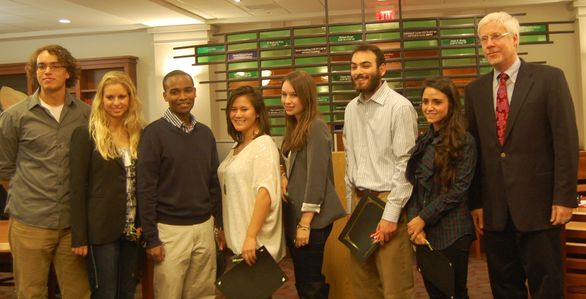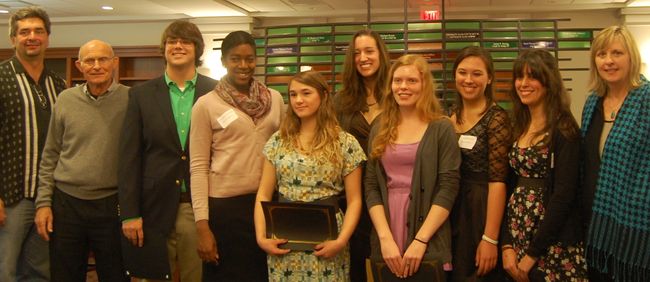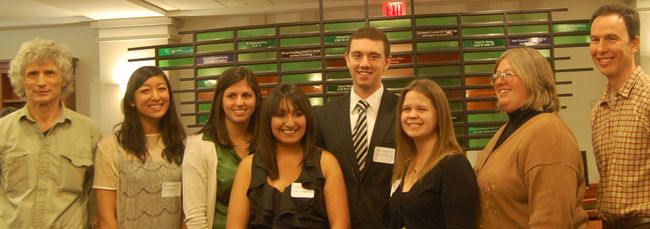CGS Capstone Awards Ceremony
U.S Foreign Policy in an Era of Danger:
2010 and Beyond
College of General Studies
CAPSTONE AWARDS
2010
Marilyn and Jeffrey Katzenberg Center
October 22, 2010
Linda S. Wells, Dean
About Capstone
The concept of a Capstone project is older than, and certainly not unique to, the College of General Studies at Boston University. A final research project has historically been considered the culmination of a liberal arts education. In addition to the historical and academic meanings of the term, there is an architectural sense to the word “capstone.” A capstone is the final block that is placed on top of a construction project to tie the whole structure together.
First, just as the construction of a building is not an individual effort, but rather a process requiring the labors of an organized group, so too is the Capstone project a group effort. Students are expected to work together for the success of the group. The more each individual gives to the group, the more each person will gain from the month’s work. When there is a genuine group effort, the final product is better and the experience is more rewarding.
Second, the Capstone project is a kind of drama, requiring an act of imagination as students assume the roles of experts or advocates and present their findings in a realworld format.
Third, the Capstone paper is not to be merely a fifty-page research term paper. Instead it is a synthesis – a combining of separate elements to form a coherent whole. Research is, to be sure, an indispensable part of the project; but to construct arguments, analyze and synthesize research in order to make a proposal or reach a verdict and to justify conclusions. In other words, research is more than gathering raw data as an end in itself. What is most important is the synthesis of these data into a meaningful whole which, if done properly, will be greater than the sum of its parts.
………………………………………………………………………………
Darfur and the Lack of Response: A Policy Recommendation
Team S
| Winners: | Faculty: |
| Aaron Coleman | Adam Sweeting |
| Elizabeth Duff | Samuel Hammer |
| Abigail Gavens | William Tilchin |
| James Getonga | |
| Anna Jacoby | Advisor: |
| Nathan Janis | Linda Bondy-Ives |
| Alissa Morrone |
“Through extensive and careful research, the students in this group explored the varied and complex problems of present-day Sudan, particularly those pertaining to Darfur and to Southern Sudan. They then developed a realistic, thoughtful, multidimensional proposal for a U.S. policy of humanitarian intervention aimed at bringing security and justice to the people of Sudan.” – Professor William Tilchin
____________________
A Comprehensive U.S. Policy Toward Zimbabwe
Team T
| Winners: | Faculty: |
| Christopher Morriseau | Leonard Andres |
| Onyemaechi Onyekwu | Shelley Hawks |
| Ann Powers | James Wilcox |
| Hilary Roberts | |
| Molly Schettewi | Advisor: |
| Andrea Sentovich | Dr. Alyse Bithavas-Glac |
| Aleksandra Vragovic |
“This winning capstone group presented a comprehensive action plan for addressing Zimbabwe’s acute humanitarian crisis from the perspective of US Foreign Policy. Their policy was exceptionally well-written and systematically organized. They argued for the US to intervene beyond previous efforts. They were unsparing in their criticism of Mugabe’s role in creating the atrocities. However, they tempered their plan to address the emergency with a sober understanding of the constraints involved.” –
Professor Shelley Hawks
____________________
Global Collaborative Climate Assembly: Sydney 2010
Team U
| Winners: | Faculty: |
| Alex Balthaser | John Mackey |
| Eli Crozier | Sally Sommers Smith |
| Pouya Dabiri | Jeffrey Vail |
| Evan Gross | |
| Joseph Hamel | Advisor: |
| Justin Katz | John Lyons |
| Benjamin Sommer | |
| Matthew Walsh |
“This team looked at the failure of the Copenhagen Climate Summit as an opportunity to plan a truly workable collaborative environmental effort that would take into account the economic and developmental goals of individual nations. Nations would “buy into” the accord according to their present economic status and projected goals, and their efforts would be assessed on a regional, rather than global, scale. This regional approach to environmental protection and economic development recognizes the necessity for widespread cooperation, but allows even the smallest and poorest nations to
partner with larger powers to realize both growth and sustainability.” – Professor Sally Sommers Smith
____________________
Global Climate Change – Report on H.R. 2454
Team V
| Winners: | Faculty: |
| Benjamin Cooper | June Grasso |
| Kelly Koltun | Robert Schoch |
| Je Hoon Lee | Robert Wexelblatt |
| Elizabeth Peters | |
| Katherine Reilly | Advisor: |
| Chelsea Resnick | Dr. Maureen Foley-Reese |
| Alexander Schneps | |
| Christopher Tang |
“This group of environmentalists set out to analyze the Obama administration’s efforts in meeting the challenges of emissions control and global warming. Their report is a meticulous evaluation of H.R. 2454, the American Clean Energy and Security Act of 2009, that analyzes the suggestions proposed to the U.S. Senate and offers substantive, realistic revisions. They specifically focus on “cap and trade” and “carbon capture and storage,” pointing out the benefits, possible setbacks, and costs of the procedures.” – Professor June Grasso
____________________
The U.S.-China Trade Deficit: How America Must Proceed
Team W
| Winners: | Faculty: |
| Michelle Arawwawela | Michael Kort |
| Joo-Hee Choi | Kari Lavalli |
| Kathryn Gilligan | Neal Leavitt |
| Sarah Lopez | |
| Adriana Robledo | Advisor: |
| Max Veggeberg | Louis Mayhew |
| Allysa Zemke |
“This group took on the difficult task of developing a coherent policy for dealing with the ever-growing trade deficit between the U.S. and China and the effects that that deficit is having on our economy. This team reviewed various options and finally settled on a two-pronged approach of providing tax incentives for U.S. businesses that kept their manufacturing bases in our country (rather than outsourcing) and of working with allies in the WTO to pressure China to change their currency policies or to impose tariffs if
China refused. Of all of the Capstone groups in Team W, this team presented the best oral defense of their policy and worked amazingly well as a group.” – Professor Kari Lavalli
____________________
Recommendations for Combating Deforestation in Chiapas, Mexico
Team X
| Winners: | Faculty: |
| Shailee Dave | Peter Busher |
| Rebecca Kauffman | Jay Corrin |
| William Liberti | Natalie McKnight |
| William Mathews | |
| Kaitlin McKinney | Advisor: |
| Emily Wienberg | Stacy Godnick |
“This project was addressed to the Commission for Environmental Cooperation (CEC), whose mission is to facilitate collaboration and public participation to foster conservation, protection and enhancement of the North American environment . These goals are to be achieved by increasing economic, trade, and social links among Canada, Mexico and the United States.” – Professor Jay Corrin





